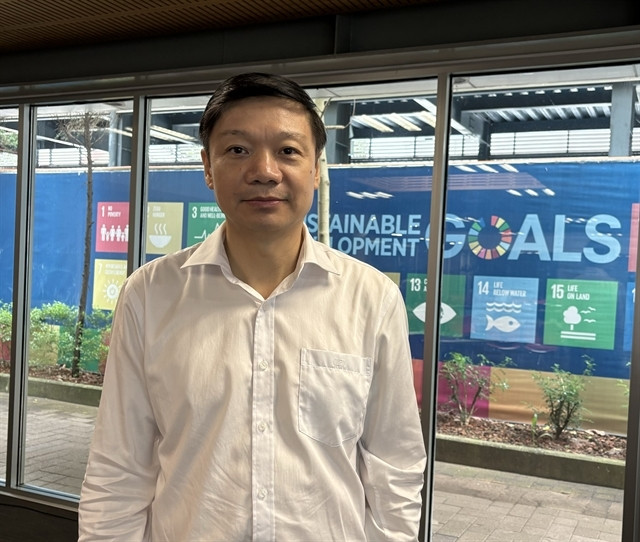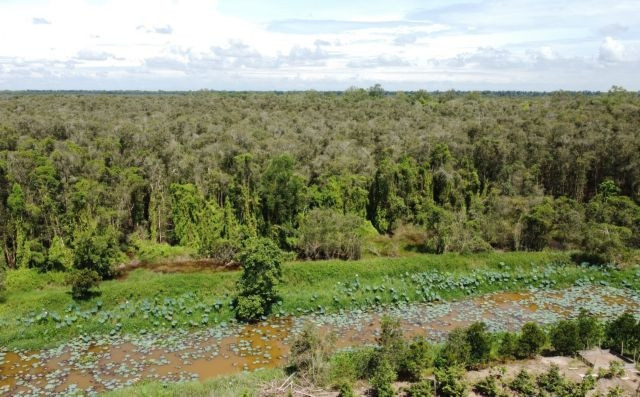 |
| Trần Quang Bảo, director of the Forestry Department under the Ministry of Agriculture and Rural Development. VNS Photo Khánh Dương |
Trần Quang Bảo, director of the Forestry Department under the Ministry of Agriculture and Rural Development, speaks to Việt Nam News reporter Khánh Dương about Việt Nam’s preparedness for the EU Deforestation Regulation (EUDR) which mandates that products placed on or exported from the EU market must be traceable, deforestation-free and produced legally.
How do you assess Việt Nam’s preparedness for the EUDR?
Việt Nam is one of the most active countries in implementing EUDR. After the EUDR came into force on June 29, 2023, Director-General of the Environment Department of the European Commission came to Việt Nam and signed, with the Minister of Agriculture and Rural Development Lê Minh Hoan, an action plan framework for EUDR compliance.
Minister Hoan had a visit to the EU to work on this issue. The Prime Minister then assigned the ministry as a steering unit of EUDR in Việt Nam.
The wood, coffee and rubber industries are the three industries in Việt Nam most affected by the EUDR regulations.
Thanks to the assistance of domestic and international partners, those three commodity groups have made preparations for EUDR. Along with that, we have specific action plans for every commodity, which are managed by the ministry.
In general we are still waiting for official regulations but based on discussions at seminars and draft documents, sectors have done trial research and built data on coffee, woods to get ready for the regulations.
One of the most important tasks is to build a forest map ready for December 31, 2020 so that all sectors can trace their products’ origins.
What are the opportunities and challenges of Việt Nam when implementing EUDR?
One of our advantages is that we closed natural forests in 2016. The coverage of planted forests is increasing very fast and we have strict regulations on actions that harm natural forests.
 |
| Gáo Giồng planted forest in the Mekong Delta province of Đồng Tháp. VNA/VNS Photo Nhựt An |
In terms of policies, I think we are ready. However, almost all of Vietnamese coffee and wood production areas are small.
When the EU conducts random evaluation on risks, we may have to explain, trace the origin and prove that area is deforestation free.
In summary we are ready to implement the EUDR but we should not lack vigilance. We must build complete data to trace products’ origins and meet EU requirements.
Now data on forests, land and other commodities are managed by various sectors.
One of the key factors is to process synchronous satellite data to be able to separate safe and risky areas.
We need synchronous implementation of the regulation from central to local levels. The central level has launched projects to support but local businesses must implement the regulations. Data sharing needs to be involved by stakeholders at all levels.
What has the Forestry Department done to support Việt Nam in EUDR implementation?
The Forestry Department is in charge of EUDR implementation in woods, one of Việt Nam’s key export products which bring high extra values.
The department needs to prepare forestry data so that other sectors can use and trace products’ origin.
Thanks to support from partners and the sector’s efforts, we are working on data building. After EU instructions are issued, we will collaborate with relevant stakeholders to implement the regulation in a synchronised manner.
We hope other sectors like coffee, environment will share data at the central and local levels.
Does the forestry sector learn from experience of other countries in the EUDR implementation?
Based on the sharing of the European Forest Institute on experiences of Ecuador, Costa Rica, Vietnamese management agencies have applied applicable experience for Việt Nam.
We think the EUDR implementation is a chance for Việt Nam to affirm the legality and sustainable values of Vietnamese exported products to the EU./ VNS
|
The EUDR, which came into force on June 29, 2023, mandates that products placed on or exported from the EU market, must be traceable, deforestation-free and legally produced. Larger companies importing these commodities into the EU must comply by December 30, 2024, while small and medium-sized enterprises must comply by June 30, 2025. According to the European Forest Institute, the EUDR does not directly impose any requirements on the Vietnamese government or Vietnamese producers. However, Vietnamese producers need to provide evidence to operators that they have complied with Vietnamese laws and regulations, which the Vietnamese Government can potentially help them do. |